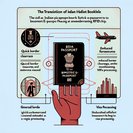
Gulf states have moved a step closer to Schengen-style travel after officials reconfirmed on 30 October that the Unified GCC Tourist Visa will enter a pilot phase before year-end. Details shared with relocation advisers show that Bahrain, Kuwait, Oman, Qatar, Saudi Arabia and the United Arab Emirates have completed technical integration of border-management systems and agreed common visitor-data fields.
During the pilot, select nationalities—expected to include EU, UK, US and key Asian outbound markets—will be able to apply online for one permit granting up to 30 days’ leisure travel across all six countries. Fees are still being finalised but are likely to undercut the combined cost of multiple single-entry visas, a move designed to stimulate multi-stop itineraries such as Dubai–Muscat–Riyadh circuits.
For UAE-based tour operators the unified visa could be transformational. Market modelling by Dubai’s Department of Economy & Tourism suggests an additional 5 million multi-country tourists annually by 2027, pushing average trip length in the region from 4.2 to 7.1 nights. Hotel groups are already bundling cross-border packages, while low-cost carriers like flydubai are eyeing feeder routes to secondary Gulf cities.
Corporate mobility managers should note that the Q4 pilot is strictly for tourism; business-entry harmonisation will follow in later phases. However, assignees’ families will benefit immediately, and the visa’s data-sharing backbone could pave the way for intra-GCC work-permit reciprocity—a long-standing objective of multinational employers with regional hubs in Dubai or Riyadh.
In practical terms, travellers will receive a single QR-coded e-visa recognised at all GCC entry points. Biometric capture takes place at the first port of arrival and is reused for subsequent crossings. Each country retains the right to refuse entry on security grounds, but officials say a joint risk-screening engine will reduce duplication and speed up processing.
During the pilot, select nationalities—expected to include EU, UK, US and key Asian outbound markets—will be able to apply online for one permit granting up to 30 days’ leisure travel across all six countries. Fees are still being finalised but are likely to undercut the combined cost of multiple single-entry visas, a move designed to stimulate multi-stop itineraries such as Dubai–Muscat–Riyadh circuits.
For UAE-based tour operators the unified visa could be transformational. Market modelling by Dubai’s Department of Economy & Tourism suggests an additional 5 million multi-country tourists annually by 2027, pushing average trip length in the region from 4.2 to 7.1 nights. Hotel groups are already bundling cross-border packages, while low-cost carriers like flydubai are eyeing feeder routes to secondary Gulf cities.
Corporate mobility managers should note that the Q4 pilot is strictly for tourism; business-entry harmonisation will follow in later phases. However, assignees’ families will benefit immediately, and the visa’s data-sharing backbone could pave the way for intra-GCC work-permit reciprocity—a long-standing objective of multinational employers with regional hubs in Dubai or Riyadh.
In practical terms, travellers will receive a single QR-coded e-visa recognised at all GCC entry points. Biometric capture takes place at the first port of arrival and is reused for subsequent crossings. Each country retains the right to refuse entry on security grounds, but officials say a joint risk-screening engine will reduce duplication and speed up processing.








